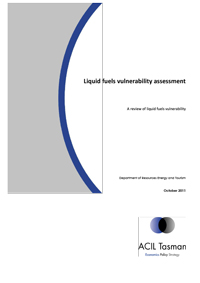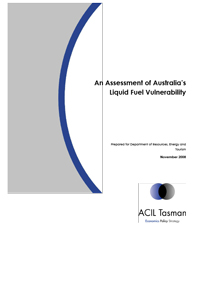Liquid Fuel Vulnerability Assessment (LFVA)
Publication date
01 Sep 2017
Resource Categories
Resource Type
Description
In 2009 and 2011, ACIL Tasman was engaged by the Federal Department of Resources, Energy and Tourism (DRET) to examine Australia's current level of liquid fuel vulnerability and significant trends which may affect this over the short, medium and longer term.
The Liquid Fuel Vulnerability Assessments comprehensively explore issues like global and regional supply-demand of crude oil and petroleum products, supply security, and supply chain reliability and flexibility into and within Australia.
A Summary of the Key Findings from the latest 2011 LFVA include:
- There has been no significant change in Australia's liquid fuels vulnerability since the 2008 review. Adequacy in terms of suppliers being able to keep up with demand has been maintained. This is likely to continue, over the medium term and potentially to 2035 according to the latest IEA World Energy Outlook.
- The need to develop more remote oil resources or unconventional sources of oil is likely to place upward pressure on prices over the longer term.
- Australia's growing dependency on oil and petroleum product imports will have limited affordability, reliability and security implications for liquid fuels supply.
- The market would respond and readjust the supply lines to replace supplies lost in the event of a disruption. Prices would rise and there would be a cost to the economy. However, the impact could be reduced in size and duration in the event of a coordinated response by IEA members designed to increase available supply.
- Ongoing investment in adequate importing capacity and storage will continue to be important in the future. However, there is sufficient clear evidence of significant recent and planned investments in import capacity to provide confidence that Australia will continue to be able to meet its growing domestic demand for liquid fuels.
- There are also measures which could which could improve the monitoring and decision-making surrounding liquid fuels supply, and also and also contribute to meeting Australia's international stock obligations (see recommendations on Page xxvi).
Copies of the Liquid Fuel Vulnerability Assessments, which were released on 27 March 2009 and 13 December 2011, are available.

